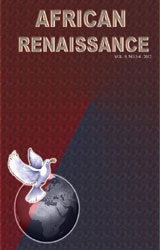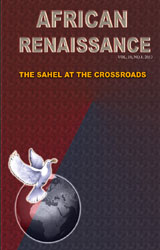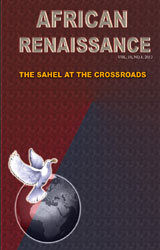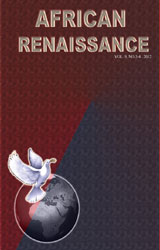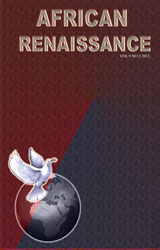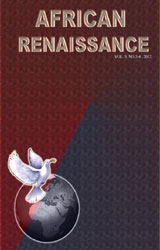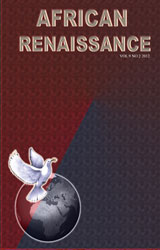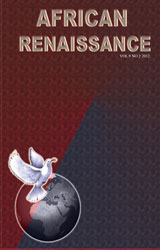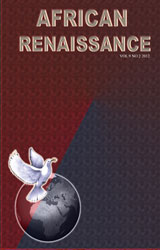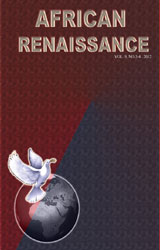
 editor@adonis-abbey.com
editor@adonis-abbey.com ![]() UK: 0207 795 8187 / Nigeria:+234 705 807 8841
UK: 0207 795 8187 / Nigeria:+234 705 807 8841

Publication Frequency: Quarterly (Four times a year) (ISSN 1744-2532 E- ISSN 2516-5305). SCImago Journal Ranking for 2024: Quartile: Q3; SJR: 0.165
View Table of Content
Life Presidency in Africa (African Renaissance Vol. 10, No.2, 2013)
The recurrent attempts by African leaders to prolong their stay in office have become one of the defining features of the African continent. The frequency of these incidents creates the impression that such a practice is an African invention. The article debunks this perception by tracing its remnants from the Roman Republic. One of the key questions that beg for attention is: why did African leaders embrace undemocratic practices and why are they reluctant to relinquish power? This is a complex question which cannot be adequately addressed in a single sentence. The primary purpose of this article is to address this question by providing a historical account on how the practice started and how it has evolved over time and in different political contexts. Using examples from different parts of Africa, the article provides broad explanations for the practice which are buttressed by specific examples. It then proposes the way forward. ...
View Table of Content
African Renaissance Vol. 10, No.1, 2013
Geographically, the Sahel is located in the northern part of the Intertropical Convergence Zone (ITCZ) where incoming solar radiation and the NE and SE trade winds meet. Thus, the region is highly susceptible to the impact of climate change. Geopolitically, this semi-arid corridor traverses the central-north of Africa covering part or all of ten countries including Senegal, Mauritania, Mali, Algeria, Niger, Chad, Sudan, South Sudan and Eritrea. In fact, these countries look like riparian states, sharing, not an actual river, but the “shore” demarcating the transition between the Sahara desert and the savannah. The Sahel covers about 3 million square km or 1.1 million square miles. Its population of about 50 million is predicted to double to 100 million in 2020 and to quadruple by 2050. Due to a combination of drought, political instability and rising food prices, an estimated 18 million people of the Sahel are facing food insecurity, caught in a vicious circle whe...
View Table of Content
African Renaissance Vol.9, Nos 3-4, 2012
The roughly 50 years of Cold War between the Western bloc and the defunct Communist bloc was not just a bipolar struggle for ideological supremacy between the capitalist and socialist systems, it was also constructed by the victorious Western camp as a moral struggle between liberal democracy (canvassed as a universal good) and a godless form of totalitarian dictatorship (viewed as inherently evil). The West indisputably won the Cold War. Communism was vanquished and most of the former communist countries euphorically embraced capitalist economic reforms with its concomitance of liberal democracy. For countries and regions on the periphery of the ideological divide, where the Cold War rivalry often precipitated varied intensities of armed conflicts, the end of the Cold War came as a welcome relief. The succeeding dispensation of “unipolarity” opened vast opportunities for a quickened end of different ideologically-anchored wars (e.g. the civil wars in Mozambiqu...
View Table of Content
African Renaissance Volume 9, Number 2, 2012
For those who like to describe phases in a country’s democratisation process in terms of “waves” (Huntington, 1991; Schraeder, 1995), the current wave of democratisation in Africa, which began with the end of the Cold War between 1989 and 1990, has arguably been the most promising for the continent. The defeat of communism in that great ideological conflict had led to a proclamation of a ‘New World Order' driven by an infrastructure of liberal democracy said to be the ‘end of history’ (Fukuyama, 1993). Democracy therefore became the new mantra, a wind of change that blew from the Berlin World through Eastern Europe to Africa like wild bush fire in harmattan. With military regimes thoroughly discredited in Africa after a prolonged military dictatorship that only helped to stunt economic and political progress in several countries in the continent, of the modernization theories that sought to justify military interventions in African pol...
View Table of Content
Terrorism in Africa (African Renaissance Vol 9 No.1 2012)
Terrorism in Africa: Beyond Essentialism Jideofor Adibe Terrorism appears to have become the scourge of our time, with terrorists inflicting both pains and fears in the minds of ordinary folks. Yet, what exactly constitutes ‘terrorism’ or ‘terrorist act’ remains mired in controversy, with the concept often manipulated by those whose political and ideological interests it serves to designate particular actions of agents they are opposed to as terrorism. The problem of definition is compounded by the fact that ‘terrorism’ is an emotionally and politically charged notion, hence one man’s terrorist could be another’s freedom fighter. Despite the lingering issue of delineation (see for instance Williamson 2009:38, Schmid, 2009), there is increasingly a broad consensus that modern terrorism could be distinguished from war and other acts of violence by some of its unique features such as...
View Table of Content
African Renaissance Vol 8 Nos3-4 2011: The Arab Spring: Africa’s Coming Winter of Disconten?) Guest editor: Gerrie Swart
The African continent has undeniably faced a tumultuous 2011. In 2011 an unprecedented uprising erupted against corrupt and repressive regimes in North Africa, now infamously known as the ‘Arab Spring’. This culminated in the fall of President Ben Ali of Tunisia’s regime in January 2011. Inspired by Tunisia’s ‘Jasmine Revolution’, Egypt swiftly followed suit, calling for the overthrow of President Hosni Mubarak’s regime. Scores of demonstrators from all ages and backgrounds subsequently seized control of Tahrir Square in central Cairo, which emerged as the hub and heart of the country’s revolution. Following 18 days of protests (characterized by Mubarak’s attempts to brutally suppress dissent, and the army’s withdrawal of support) Mubarak was forced to stand down and is currently facing what is likely to be a lengthy and difficult trial. In November 2011 Egypt’s Tahrir Square was once again the scene ...
View Table of Content
AFRICAN DIASPORAS African Renaissance Volume 8, No 2, 2011
Diaspora Studies as an academic field was developed some fifty years ago and has seen a rapid growth, with books such as The African Diaspora: African Origins and New World Identities by Okpewho, Boyce Davies & Mazrui (eds, 2001), Gomez’s Diasporic Africa: A Reader (2005) and The Oxford Companion to Black British History by Dabydeen, Gilmore & Jones (eds, 2007). Journals such as African and Black Diaspora: An International Journal, and African Diaspora have been publishing on a regular basis, and a number of international conferences have taken place to further explore this vast field. While the United States boast the highest number of university programmes on the subject, in the UK, SOAS launched its Centre for Migration and Diaspora Studies in 2007, and Edinburgh University Scottish Centre for Diaspora Studies opened in 2008. This issue of African Renaissance offers a reflection on aspects of African Diasporas, giving a voice to researchers ...
View Table of Content
Social Movements and Nation-building in South Africa and Nigeria (African Renaissance, Volume 8 No 1 2011)
Social Movements and Nation-building in South Africa and Nigeria In the lecture that he gave at the University of the Free State in Bloemfontein, South Africa to mark this year’s Africa Day, Ali A. Mazrui, who is also one of Africa’s foremost scholars observed inter alia: “Among the intriguing paradoxes of South Africa’s history is that this land is the last country on the African continent to be liberated, and yet it is also among the first to be truly democratized. In our context here, liberation is either from racial minority rule or from colonialism in the imperial sense. On the other hand, democratization is either the quest for, or the consolidation of a system which combines government’s accountability, with popular participation, and links the pursuit of social justice with open society.” Ali A. Mazrui’s assertion above portrays quite aptly the arguments that the authors of the four articles in thi...
View Table of Content
African Renaissance (lead theme: The Slavery Debate Continues) Vol 7 Nos 3-4 2010
The slavery debate, especially as it concerns the demand for reparation, was recently re-ignited by Henry Gates Jnr in an Op-ed to the New York Times on April 22 2010 (‘Ending the Slavery Blame Game’) where he contended that the role played by Africans is often underplayed in the slavery blame game. He argued: Advocates of reparations for the descendants of those slaves generally ignore this untidy problem of the significant role that Africans played in the trade, choosing to believe the romanticized version that our ancestors were all kidnapped unawares by evil white men, like Kunta Kinte was in “Roots.” The truth, however, is much more complex: slavery was a business, highly organized and lucrative for European buyers and African sellers alike. (Gates Jnr: 2010) Gates contended that that the complicity of Africans makes it difficult to talk about reparation as it would be difficult to determine the level of culpability of ...
To subscribe to any of the journals, Please Email Us.




